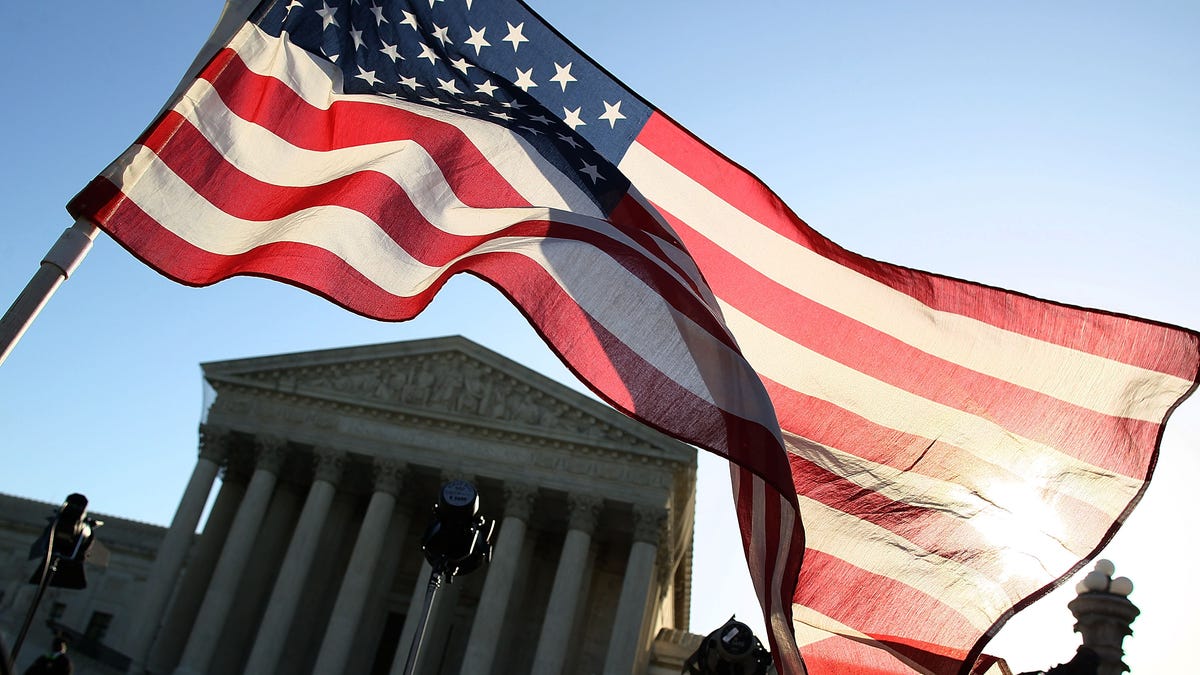
WASHINGTON, DC - MARCH 26: A person carries an American flag while marching in favor of the Patient Protection and Affordable Care Act in front of the U.S. Supreme Court on March 26, 2012 in Washington, DC. Today the high court, which has set aside six hours over three days, will hear arguments over the constitutionality President Barack Obama's Patient Protection and Affordable Care Act. (Photo by Mark Wilson/Getty Images) (2012 Getty Images)
Within a few hours of the announcement of the death of Supreme Court Justice Antonin Scalia, his passing was already being politicized. “The American people should have a voice in the selection of their next Supreme Court justice,” said Senate Majority Leader Mitch McConnell. “Therefore, this vacancy should not be filled until we have a new president.”
As Republican leaders and presidential hopefuls echoed his words, Democrats fought back with charges of “partisan sabotage.” Meanwhile, the White House announced that the president would be spending the weekend studying the dossiers of potential nominees.
Since 1900, the Senate has voted eight times on nominees in an election year. Six were confirmed, including the legal giants Louis Brandeis (1916) and Benjamin Cardozo (1932). More recently, Ronald Reagan nominated Justice Anthony Kennedy in 1987 and he was confirmed in 1988.
McConnell and his Republican colleagues have it wrong. President Obama has a constitutional obligation to name a replacement for Justice Scalia. The Constitution and history are on his side. What’s more, President Obama should cement his legacy as an inclusive president by choosing a qualified person of color for the job.
To McConnell’s concern that the American people should have a voice in choosing the next Supreme Court justice, they already have. They’ve had done it twice, as they elected Obama as president for two four-year terms. When Scalia passed away, the president still had 340 days left in his term, and it would be an abrogation of his sworn Constitutional duty for him to wait for a successor to name a replacement.
“Justice Scalia was an American hero. We owe it to him, & (sic) the Nation, for the Senate to ensure that the next President names his replacement,” Sen. Ted Cruz tweeted last week. How ironic that Cruz, a self-described lover of the Constitution, holds such an indefensible position. Article 2 of the Constitution states that the President “shall have power, by and with the advice and consent of the Senate” to nominate and appoint Supreme Court judges. Notice that there is no exception for the last year of his term, or the last few months of his term. The Constitution clearly grants the president authority to name Supreme Court judges.
- Tourism livens up Mexican beach known as ‘Playa de los Muertos’
- New details of Scalia’s ailing health before his death differ from friends’ accounts
- Justices, family, mourners pay respects to late Justice Scalia
- Best pix of the week
- ‘Hamilton’ blows the Grammy night away
- Opinion: The Supreme Court can help protect small businesses from new patent troll threat
Still, at the recent GOP debate in South Carolina, Marco Rubio asserted, “It’s been over 80 years since a lame duck president has appointed a Supreme Court Justice.” But as the New York Times has noted, there is in fact historical precedent for President Obama to take action. Since 1900, the Senate has voted eight times on nominees in an election year. Six were confirmed, including the legal giants Louis Brandeis (1916) and Benjamin Cardozo (1932). More recently, Ronald Reagan nominated Justice Anthony Kennedy in 1987 and he was confirmed in 1988.
Besides, the “lame duck period” – during which presidents often stand down on major decisions – is a long way off. The “lame-duck period” is not the final year of a president’s term; it is the period of time between the election of his successor and when that successor takes office. Until then, President Obama is charged with fulfilling all of his responsibilities.
When he does nominate a successor for Scalia, Obama should make history again by nominating a qualified person of color. There are several strong minority candidates for the Court, including D.C. Circuit Court Judge Sri Srinivasan, Attorney General Loretta Lynch, Circuit Court Judge Adalberto Gordon, or California Supreme Court Judge Mariano-Florentino Cuellar. The qualifications and credentials of these potential candidates would be a significant addition to the Court. With the Census showing that nearly half of U.S. children come from communities of color, it is imperative that we have a judiciary that looks like America. And the coming term will decide cases involving immigration, voting rights, and affirmative action – issues that are important to Latinos and other minorities – so a broad judicial perspective will be welcome.
True, there is a role for Republicans in the Senate to play in selecting a replacement for Scalia. They can either confirm or reject any of Obama’s nominees. What they should not do is refuse to hold confirmation hearings. Any nominee who is willing to go through the lengthy confirmation process deserves better, as do the American people. Consider that polling shows that a majority of the public believes that Obama should make his high court pick. Or that even retired Justice Sandra Day O’Connor, a Reagan appointee, believes that Obama should choose a new justice. "I don't agree (with Republicans)," she said. "We need somebody in there to do the job and just get on with it."
Republican lawmakers and candidates ought not to stand in the way of Obama doing his job. He must nominate a new Supreme Court justice, and any obstruction of that responsibility is a disservice to the nation.
